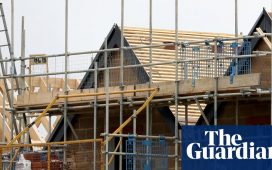Unlock the Editor’s Digest for free
Roula Khalaf, Editor of the FT, selects her favourite stories in this weekly newsletter.
Sir Keir Starmer is expected to set out an extensive package of pro-development planning reforms within days, as part of plans to “get Britain building again” and address the country’s acute housing shortage.
The new Labour prime minister wants to “hit the ground running” on his promised overhaul of the UK’s sclerotic planning regime with an announcement as early as the weekend, according to people familiar with the plans.
Starmer, who swept to power in a landslide election win, wants to reimpose previous house building targets on local councils that were watered down by the previous Conservative government.
He also wants to rewrite the National Planning Policy Framework — the policy guidance given to authorities on housing — so that it emphasises more of a presumption in favour of development, the people added.
A senior Whitehall official said Labour was expected to try and unleash investment in house building through greenbelt reforms that would release “grey belt” areas of ugly yet protected land for development.
One person close to the Labour leadership said ministers were likely to set out more detail on the “structure” and timing of the planning reforms as one of the first big announcements by the new government.
The reforms are a critical part of Labour’s plan to pull the UK out of a decade of low growth and productivity.
Two housing industry figures said they had been told Labour intends to make rapid progress on a “Towns Bill” to provide the legal underpinning for the party’s ambition to build new towns and urban extensions in England.
The bill would hand stronger powers to local authorities and development corporations to compulsorily purchase land.
The party is actively considering a move to unlock land for development by introducing a cap on the value of undeveloped agricultural land that local authorities are required to pay when they compel sales, according to a person with knowledge of the plans.
Such a move would help local authorities drive forward larger developments by bringing costs down.
The person added that Labour would, if it went ahead, impose an upper limit that would still allow landowners to demand a price that was several multiples of the land’s undeveloped value.
The new government will also promise funding for councils to hire about 300 planning officers to boost their depleted planning departments.
Labour did not immediately respond to a request for comment.
Shares in Britain’s leading housebuilders rose on Friday morning in anticipation of the reforms, as the UK awoke to Labour’s decisive win over Rishi Sunak’s Conservatives.
FTSE 100 housebuilders Vistry, Persimmon, Barratt and Taylor Wimpey all climbed by between 2 per cent and 3 per cent by mid-afternoon.
Matthew Tucker, senior associate at Burges Salmon, a Bristol-based law firm that advises property developers and local authorities, said that taken together, the measures had the potential to be transformative if they were implemented in a sufficiently ambitious manner.
“Land value is at the heart of quite a few of the changes that are in the pipeline. If we’re talking about unlocking chunks of the greenbelt, then the impacts of that on land values will, in my view, be very significant,” he added.
Various different administrations have tried to tackle Britain’s planning system over the past few decades. They have repeatedly run into powerful interests opposed to building on undeveloped rural and semi-rural land.
Labour’s target of building 1.5mn homes over the next Parliament is not dissimilar to the Conservatives’ old target of building 300,000 homes a year by the mid-2020s. “The difference is that we intend to hit it,” said one Labour aide.
New home completion figures from last year fell short at 212,570, barely changed from the year before. Forecast suggests the numbers will fall sharply this year as the property market slowdown bites.
Paul Cheshire, emeritus professor of economic geography at the London School of Economics, said steps to reduce the cost of agricultural land would be helpful, adding that one step would be the abolition of inheritance tax relief on agricultural land.
But he warned that Labour’s attempts to bolster homebuilding would take time to pay off. “It’s like turning a tanker around. Even if these steps are pursued vigorously, they will be lucky if they can get up to 300,000 homes built a year in four years’ time.”










